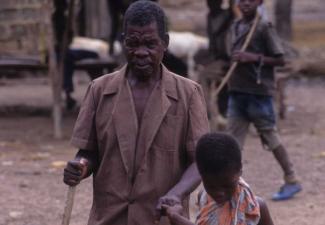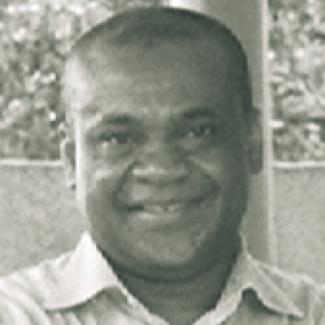Blind in Benin
In Benin, the blind struggle to fend for themselves

To understand the plight of blind people in Benin, one must only walk along the main street of the overcrowded Zongo neighbourhood around midday on Fridays, when Muslims stream to the mosque for weekly prayers. Large numbers of blind people follow in their wake, begging for alms. Some of the blind are so desperate that they swarm around the few individuals who seem inclined to help.
In fact, to be visually impaired in Benin is to be nearly helpless. In the absence of systematic support from government, affected individuals depend on others for nearly everything: food, shelter, medicine and help with daily tasks such as eating, dressing, showering and getting to a restroom.
The neglect and prejudice start early in life. “Many parents believe that a handicapped child is a burden,” says Alexis Boton, director of the centre for social promotion of blind people in Parakou, about 400 kilometres north of Cotonou. “Often, they are not keen on helping their own offspring.’’
Preventable misery
Much of the misery could be prevented through early detection and treatment of incipient blindness. According to a 2018 study co-authored by Salimatou Monteiro of the Benin-based University of Parakou, over 40 % of visually impaired patients surveyed had become blind due to preventable or avoidable causes.
“The prevalence of avoidable causes of blindness is high,” the scholars state. “Efforts still need to be made to improve the prevention and diagnosis of avoidable ophthalmic disorders that may lead to blindness, through better access to and high quality of eye care.” Their study was published in the Journal of Clinical Research and Ophthalmology.
The main causes of visual impairment in Benin are age-related cataracts and glaucoma. Other causes include refractive errors and disorders of the macula, an important area in the centre of the retina.
The severity of the handicap varies by age, income and geography. Some people living in remote villages near rivers fall victim to river blindness. This tropical disease is transmitted by biting blackflies that breed in fast-flowing water. If this infection is detected early enough, the victims can recover after treatment. Unfortunately, many seek help only after it is too late to prevent blindness.
Other contributors to blindness in Benin are related to income. They include a poor diet, deficient hygiene, untreated high blood pressure and untreated diabetes. Many people lack of access to medical care. Such factors accelerate the spread of “diseases of the poor” – illnesses and conditions that affect patients who do not get proper medicine and need better living conditions (see Sheila Mysorekar’s 2016 essay on www.dandc.eu). This situation is hardly confined to Benin, but basically the same in many African countries (see Maxwell Suuk on www.dandc.eu).
Despite limited budgets, though, government agencies can and should do more to support Benin’s visually impaired people, says Father André Kpadonou. He is a blind catholic priest based in Zagnanado, 165 kilometres from Cotonou. He lost his eyesight after becoming a priest, but never abandoned his mission to support vulnerable people. According to him, non-state actors should get involved too.
Father Kpadonou regularly publishes articles and books, trying to sensitise government, NGOs and society at large to the plight of blind people. He learned to use Braille and digital tools and misses no opportunity to communicate. ‘’I may be blind’’, he says, ‘’but my mouth and my ears work perfectly.”
He challenges the government to provide specific helpful measures, even though budgets are limited. For example, he wants the government to provide decent housing for blind people, so they must not live on sidewalks.
He also insists that white walking sticks should be issued to blind people, to help them to get around and to be recognised by others as visually impaired. Moreover, he calls for holding reckless car and moped drivers to account if they injure blind pedestrians. In the absence of designated street crossings, many visually impaired people get knocked over by vehicles while trying to cross a street.
Tangible results
Father Kpadonou wants NGOs and faith-based charities to do their part by providing skills training and helping blind people find jobs. Two faith-based organisations stand out as examples of the right way to proceed, he says: the Siloé Center in the village of Djanglanmè and the Father Paul Rival Center in Adjohoun in southern Benin. They provide food, hygiene measures and skills training free of charge.
That kind of work shows tangible results. A religious order saved one young girl who was born blind and cast out of her family. It gave her shelter, food and an education. She grew up to become a nun in the ‘”Soeurs Servantes de la Lumière du Christ”’ (Sisters Servants of the Light of Christ).
Ultimately, though, faith-based charities can help only the lucky few. To improve the lives of the large numbers of blind and visually impaired people in Benin, formal help is needed from government and many more NGOs. With systematic medical screening and proper health care, as well as job training and support for daily needs, the country’s visually impaired people could live far better lives than they do today.
Link
Salimatou Monteiro, S., et al, 2018: Causes of avoidable blindness in Parakou. Journal of Clinical Research and Ophthalmology, October 2018.
https://www.peertechzpublications.com/articles/JCRO-5-152.php
Karim Okanla is a media scholar and freelance author based in Benin.
karimokanla@yahoo.com







